The witching hour lotmw-1 Read online
Page 3
What nonsense. Here it was six thirty, and the shot was long overdue. And the syringe was ready.
Suddenly something pushed him. He was sure of it, though where he had been pushed he couldn’t say. He went down, his legs buckling, and the syringe went flying.
When he caught himself he was on his knees in the semidark, staring at motes of dust gathered on the bare floor beneath the bed.
“What the hell-” he’d said aloud before he could catch himself. He couldn’t find the hypodermic needle. Then he saw it, yards away, beyond the armoire. It was broken, smashed, as if someone had stepped on it. All the Thorazine had oozed out of the crushed plastic vial onto the bare boards.
“Now, wait a minute!” he whispered. He picked it up and stood holding the ruined thing in his hands. Of course he had other syringes, but this was the second time this sort of thing … And he found himself at the bedside again, staring down at the motionless patient, thinking, now how exactly did this-I mean, what in God’s name is going on?
He felt a sudden intense heat. Something moved in the room, rattling faintly. Only the rosary beads wound about the brass lamp. He went to wipe his brow. Then he realized, very slowly, even as he stared at Deirdre, that there was a figure standing on the other side of the bed. He saw the dark clothes, a waistcoat, a coat with dark buttons. And then he looked up and saw it was the man.
In a split second his disbelief changed to terror. There was no disorientation now, no dreamlike unreality. The man was there, staring at him. Soft brown eyes staring at him. Then the man was simply gone. The room was cold. A breeze lifted the draperies. The doctor caught himself in the act of shouting. No, screaming, to be perfectly frank.
At ten o’clock that night, he was off the case. The old psychiatrist came all the way out to the lakefront apartment house to tell him in person. They had gone down to the lake together and strolled along the concrete shore.
“These old families, you can’t argue with them. And you don’t want to tangle with Carlotta Mayfair. The woman knows everybody. You’d be amazed how many people are beholden to her for one thing and another, or to Judge Fleming. And these people own property all over the city, if you only … ”
“I tell you I saw this!” the doctor found himself saying.
But the old psychiatrist was dismissing him. There was a thinly concealed suspicion in his eyes as they measured the younger doctor up and down, though the agreeable tone of his voice never changed.
“These old families.” The doctor was never to go to that house again.
The doctor said nothing more. The truth was, he felt foolish. He wasn’t a man who believed in ghosts! And he could not now bring himself to mount any intelligent argument about the woman herself, her condition, the obvious need for some periodic evaluation. No, his confidence had been dashed altogether.
Yet he knew he’d seen that figure. Seen it three times. And he could not forget the afternoon of the hazy, imagined conversation. The man had been there, too, yes, but insubstantial! And he had known the man’s name, and yes, it was … Lasher!
But even if he discounted the dreamlike conversation-blamed it on the quiet of the place and the infernal heat, and the suggestion of a word carved into a tree trunk-the other times could not be discounted. He had seen a solid, living being there. No one would ever get him to deny it.
As the weeks passed and he failed to distract himself sufficiently with his work at the sanitarium, he began to write about the experience, describe it in detail. The man’s brown hair had been slightly wavy. Eyes large. Fair skin like the poor sick woman. The man had been young, no more than twenty-five at best. The man had been without discernible expression. The doctor could even remember the man’s hands. Nothing special about them, just nice hands. It struck him that the man, though thin, had been well proportioned. Only the clothes seemed unusual, and not the style of them, which was ordinary enough. It was the texture of the clothing. Unaccountably smooth like the face of the man. As if the whole figure-clothes, flesh, face-were made from the same thing.
One morning, the doctor awoke with the curiously clear thought: the mysterious man hadn’t wanted her to have those sedatives! He’d known they were bad. And the woman was defenseless of course; she could not speak in her own behalf. The specter was protecting her!
But who in God’s name will ever believe all this? the doctor thought. And he wished he were home, in Maine, working in his father’s clinic and not in this damp and alien city. His father would understand. But then, no. His father would only be alarmed.
He tried to “keep busy.” But the truth was, the sanitarium was a boring place. He had little to do. The old psychiatrist gave him a few new cases, but they were not challenging. Yet it was essential that the doctor continue, that he erase all suspicion from the old psychiatrist’s mind.
As fall turned to winter, the doctor began to dream of Deirdre. And in his dreams, he saw her cured, revitalized, walking swiftly down a city street, her hair blowing in the wind. Now and then when he woke up from such a dream, he found himself wondering if the poor woman hadn’t died. That was the more likely thing.
When spring came around, and he had been in the city a full year, he found he had to see the house again. He took the St. Charles car to Jackson Avenue and walked from there as he had always done in the past.
It was all exactly the same, the thorny bougainvillea in full bloom over the porches, the overgrown garden swarming with tiny white winged butterflies, the lantana with its little orange blossoms pushing through the black iron fence.
And Deirdre sitting in the rocker on the side porch behind her veil of rusted screens.
The doctor felt a leaden anguish. He was as troubled, perhaps, as he’d ever been in his life. Somebody’s got to do something for that woman.
He walked aimlessly after that, emerging finally on a dirty and busy street. A shabby neighborhood tavern caught his eye. He went into it, grateful for the icy air-conditioning and the relative quiet in which only a few old men talked in low voices along the bar. He took his drink to the last wooden table in the back.
The condition of Deirdre Mayfair tortured him. And the mystery of the apparition only made it worse. He thought of that daughter in California. Did he dare to call her? Doctor to doctor … But then he did not know the young man’s name.
“Besides, you have no right to interfere,” he whispered aloud. He drank a little of his beer, savoring the coldness. “Lasher,” he whispered. Speaking of names, what sort of name is Lasher? The young California intern would think him a madman! He took another deep drink of the beer.
It seemed to him suddenly that the bar was getting warm. It was as if someone had opened the door on a desert wind. Even the old men talking over their beer bottles seemed to notice it. He saw one of them wipe his face suddenly with a dirty handkerchief, then go on arguing as before.
Then as the doctor lifted his glass, he saw straight in front of him the mysterious man seated at the table near the door to the street.
The same waxen face, brown eyes. The same nondescript clothes of that unusual texture, so smooth they shone faintly in the subdued light.
Even as the men nearby went on with their conversation, the doctor felt the keening terror he had known in Deirdre Mayfair’s darkened room.
The man sat perfectly still gazing at him. Not twenty feet separated him from the doctor. And the white daylight from the front windows of the bar fell quite distinctly over the man’s shoulder, illuminating the side of his face.
Really there. The doctor’s mouth was filling with water. He was going to be sick. Going to pass out. They’d think he was drunk in this place. God only knew what would happen-He struggled to steady his hand on the glass. He struggled not to panic completely as he had done in Deirdre’s room.
Then, without warning, the man appeared to flicker as if he were a projected image, then vanish before the doctor’s eyes. A cold breeze swept through the bar.
The bartender turned to keep a
soiled napkin from blowing away. A door slammed somewhere. And it seemed the conversation grew louder. The doctor felt a low throbbing in his head.
“ … Going mad!” he whispered.
No power on earth could have persuaded him to pass Deirdre Mayfair’s house again.
But the following night, as he was driving home to the lakefront, he saw the man again, standing under a street lamp by the cemeteries on Canal Boulevard, the yellow light shining full upon him against the chalk white graveyard wall.
Just a glimpse but he knew he wasn’t mistaken. He began to tremble violently. It seemed for a moment he could not remember how to work the controls of his car, and then he drove it recklessly, stupidly, as if the man were pursuing him. He did not feel safe until he had shut his apartment door.
The following Friday, he saw the man in broad daylight, standing motionless on the grass in Jackson Square. A woman passing turned to glance at the brown-haired figure. Yes, there, as he had been before! The doctor ran through the French Quarter streets. Finding a cab at a hotel door, he ordered the driver to get him out of there, just to take him anywhere, he did not care.
As the days passed, the doctor had ceased to be frightened so much as horrified. He couldn’t eat or sleep. He could concentrate on nothing. He moved perpetually in utter gloom. He stared in silent rage at the old psychiatrist whenever their paths crossed.
How in God’s name could he communicate to this monstrous thing that he would not come near the miserable woman in the porch rocker? No more needles, no more drugs from him! I am no longer the enemy, don’t you see!
To ask the help or understanding of anyone he knew was to risk his reputation, even his entire future. A psychiatrist going mad, like his patients. He was desperate. He had to escape this thing. Who knew when it might next appear to him? What if it could come into these very rooms!
Finally on Monday morning, his nerves frayed, his hands shaking, he found himself in the old psychiatrist’s office. He had not made up his mind what he would say, only that he could stand the strain no longer. And he soon found himself rattling on about the tropical heat, headaches and sleepless nights, the need for quick acceptance of his resignation.
He drove out of New Orleans that very afternoon.
Only when he was safe in his father’s office in Portland, Maine, did he at last reveal the whole story.
“There was never anything menacing in the face,” he explained. “On the contrary. It was strangely unlined. It was as bland as the face of Christ in the portrait on the wall of her room. Just staring at me. But it didn’t want me to give her the injection! It was trying to scare me.”
His father was a patient man. He did not answer at once. Then slowly he began to talk of the strange things he’d witnessed over the years in psychiatric hospitals-doctors seemingly infected with the neuroses and psychoses of their patients. He’d seen a doctor go catatonic one day in the midst of his catatonic patients.
“The important thing. Larry, is that you rest,” his father said. “That you let the effects of this whole thing wear off. And that you don’t tell anyone else about it.”
Years had passed. The doctor’s work in Maine had gone well. And gradually he had built a solid private practice independent of his father.
As for the specter, he had left it behind him in New Orleans, along with the memory of Deirdre Mayfair, sitting eternally in that chair.
Yet there remained in him a lingering fear that he might someplace or other see the thing again. There was the lingering fear that if such a thing had happened once, it might happen another time for entirely different reasons. The doctor had tasted real horror in those damp, dark New Orleans days, and his view of the world had never been the same.
Now, as he stood beside the window in the darkened hotel room in New York, he found the whole affair overwhelming him again. And as he had done a thousand times before, he analyzed the strange tale. He searched for its deeper meaning.
Was the thing really stalking him in New Orleans, or had the doctor misunderstood the silent specter?
Maybe the man had not tried to scare him at all. Maybe it had in fact been pleading with him not to forget that woman! Perhaps in some way it was a bizarre projection of the woman’s own desperate thoughts, an image sent to him by a mind which knew no other means of communication.
Ah, there was no comfort in such an idea. Too awful to imagine the helpless woman pleading with him through a spectral emissary, who, for reasons never to be known, could not speak, but only appear for brief moments.
But who could interpret these strange elements? Who would venture to say the doctor was right?
Aaron Lightner, the Englishman, the collector of ghost stories, who had given him the card with the word Talamasca? He had said that he wanted to help the drowned man in California: “Maybe he doesn’t know that it has happened to others. Maybe I am needed to tell him that others have also come back from the edge of death with such gifts.”
Yes, that would help, wouldn’t it? To know that others had seen ghosts too?
But that was not the worst of it, seeing a ghost. Something worse than fear had taken him back to that screen porch and to the wan figure of the woman in the rocker. It was guilt, guilt he would bear all his life-that he had not tried harder to help her, that he had never called that daughter out west.
The morning light was just breaking over the city. He watched the change in the sky, the subtle illumination of the soiled walls opposite. Then he went to the closet and removed the Englishman’s card from his coat pocket.
THE TALAMASCA
We watch
And we are always here.
He picked up the telephone.
It was an hour in the telling, which surprised him, but all those details had come tumbling back. He had not minded the little tape recorder going, with its tiny red eye blinking. After all he had used no names, no street numbers, not even any dates. New Orleans, an old house, he had said. And on and on he had talked. He realized now that he had never touched his breakfast, except to empty the coffee cup over and over again.
Lightner had proved an excellent listener, responding gently without ever interrupting. But the doctor did not feel better. In fact, he felt foolish when it was over. As he watched Lightner gather up the little recorder and put it in his briefcase, he had half a mind to ask for the tape.
It was Lightner who broke the silence as he laid down several bills over the check.
“There’s something I must explain to you,” he said. “I think it will ease your mind.”
What could possibly do that?
“You remember,” Lightner said, “that I told you I collect ghost stories.”
“Yes.”
“Well, I know of that old house in New Orleans. I’ve seen it. And I’ve recorded other stories of people who have seen the man you described.”
The doctor was speechless. The words had been said with utter conviction. In fact, they had been spoken with such authority and assurance that the doctor believed them without doubt. He studied Lightner in detail for the first time. The man was older than he seemed on first inspection. Perhaps sixty-five, even seventy. The doctor found himself captivated again by Lightner’s expression, so affable and trusting, so inviting of trust in return.
“Others,” the doctor whispered. “Are you sure?”
“I’ve heard other accounts, some very like your own. And I tell you this so you can understand that you didn’t imagine it. And so that it doesn’t continue to prey on your mind. You couldn’t have helped Deirdre Mayfair, by the way. Carlotta Mayfair would never have allowed it. You ought to put the entire incident out of your mind. Don’t ever worry about it again.”
For a moment the doctor felt relief, as if he’d been in the Catholic confessional and the priest had spoken the words “I absolve.” Then the full import of Lightner’s revelations struck him.
“You know these people!” he whispered. He felt his face color. This woman had been his patient.
He was suddenly and completely confused.
“No. I know of them,” Lightner answered. “And I shall keep your account entirely confidential. Please be assured. Remember, we did not use names on the tape recording. We did not even use your name or mine.”
“Nevertheless, I must ask you for the tape,” the doctor said, flustered. “I’ve broken confidentiality. I had no idea you knew.”
At once Lightner removed the small cassette and placed it in the doctor’s hand. The man seemed entirely unruffled. “Of course you may have it,” he said. “I understand.”
The doctor murmured his thanks, the confusion intensifying. Yet the relief was not altogether gone. Others had seen that creature. This man knew it. He wasn’t lying. The doctor was not, and had never been, out of his mind. A faint bitterness surfaced inside him, bitterness towards his superiors in New Orleans, towards Carlotta Mayfair, towards that ghastly Miss Nancy …
“The important thing,” said Lightner, “is that you do not worry about it any more.”
“Yes,” said the doctor. “Horrible, all of it. That woman, the drugs.”
No, don’t even … He went quiet, staring at the cassette, and then at his empty coffee cup. “The woman, is she still-”
“The same. I was there last year. Miss Nancy died, the one you disliked so much. Miss Millie went some time ago. And now and then I hear from people in the city, and the report is that Deirdre has not changed.”
The doctor sighed. “Yes, you do indeed know of them … all the names,” he said.
“Then please do believe me,” Lightner said, “when I tell you others have seen that vision. You weren’t mad, not at all. And you mustn’t worry foolishly about such things.”

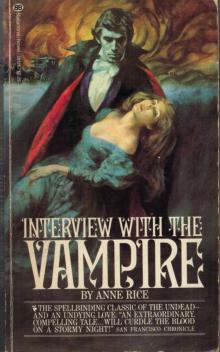 Interview with the Vampire
Interview with the Vampire Christ the Lord: Out of Egypt
Christ the Lord: Out of Egypt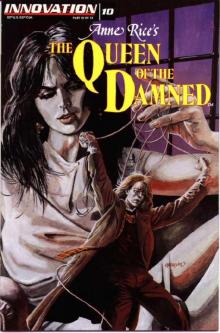 The Queen Of The Damned
The Queen Of The Damned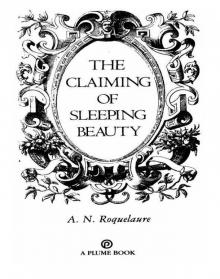 The Claiming of Sleeping Beauty
The Claiming of Sleeping Beauty Prince Lestat
Prince Lestat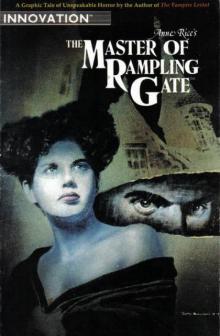 The Master of Rampling Gate
The Master of Rampling Gate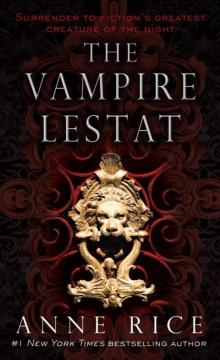 The Vampire Lestat
The Vampire Lestat Blood Canticle
Blood Canticle Beauty's Release
Beauty's Release Pandora
Pandora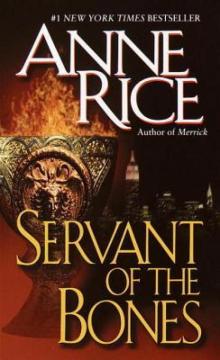 Servant of the Bones
Servant of the Bones Of Love and Evil
Of Love and Evil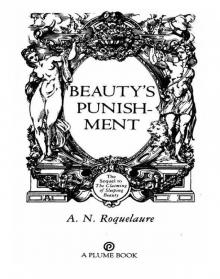 Beauty's Punishment
Beauty's Punishment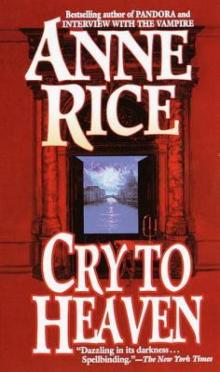 Cry to Heaven
Cry to Heaven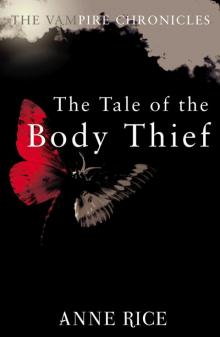 The Tale of the Body Thief
The Tale of the Body Thief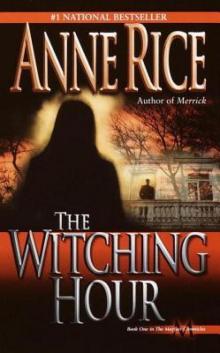 The Witching Hour
The Witching Hour Memnoch the Devil
Memnoch the Devil Blackwood Farm
Blackwood Farm Beauty's Kingdom
Beauty's Kingdom Belinda
Belinda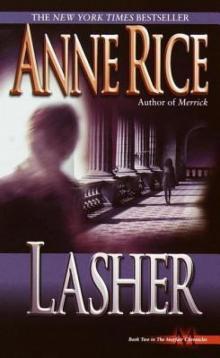 Lasher
Lasher Vittorio, the Vampire
Vittorio, the Vampire Angel Time
Angel Time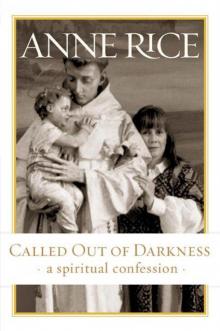 Called Out of Darkness: A Spiritual Confession
Called Out of Darkness: A Spiritual Confession Blood And Gold
Blood And Gold The Passion of Cleopatra
The Passion of Cleopatra Taltos
Taltos Exit to Eden
Exit to Eden Blood Communion (The Vampire Chronicles #13)
Blood Communion (The Vampire Chronicles #13) The Wolf Gift
The Wolf Gift The Wolves of Midwinter
The Wolves of Midwinter Prince Lestat and the Realms of Atlantis
Prince Lestat and the Realms of Atlantis The Ultimate Undead
The Ultimate Undead The Vampire Lestat tvc-2
The Vampire Lestat tvc-2 The Road to Cana
The Road to Cana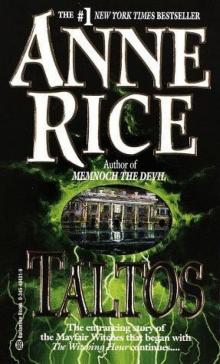 Taltos lotmw-3
Taltos lotmw-3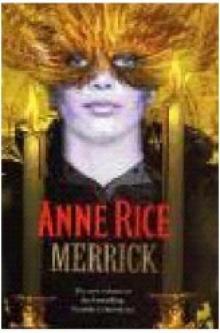 Merrick tvc-7
Merrick tvc-7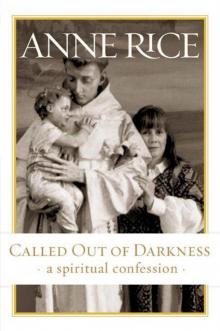 Called Out of Darkness
Called Out of Darkness Pandora - New Vampires 01
Pandora - New Vampires 01 Bllod and Gold
Bllod and Gold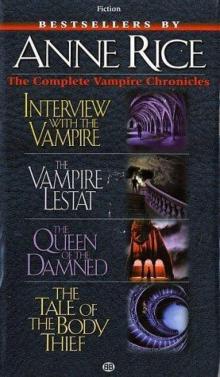 The Queen Of the Damned: Vampire Chronicles
The Queen Of the Damned: Vampire Chronicles The Sleeping Beauty Trilogy
The Sleeping Beauty Trilogy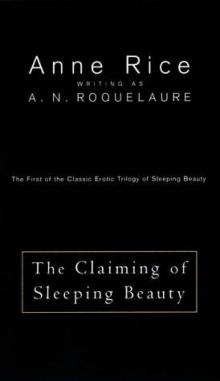 The Claiming of Sleeping Beauty b-1
The Claiming of Sleeping Beauty b-1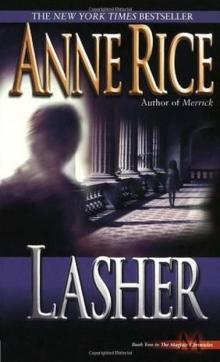 Lasher lotmw-2
Lasher lotmw-2 The Tale of the Body Thief tvc-4
The Tale of the Body Thief tvc-4 The Vampire Chronicles Collection
The Vampire Chronicles Collection Ramses the Damned
Ramses the Damned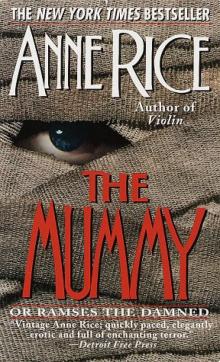 The Mummy - or Ramses the Damned
The Mummy - or Ramses the Damned Vittorio, The Vampire - New Vampires 02
Vittorio, The Vampire - New Vampires 02 The Vampire Armand tvc-6
The Vampire Armand tvc-6 Queen of the Damned tvc-3
Queen of the Damned tvc-3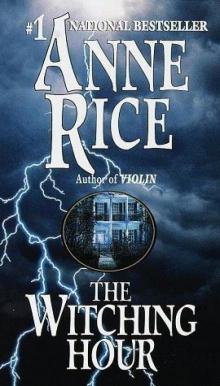 The witching hour lotmw-1
The witching hour lotmw-1 Feast of All Saints
Feast of All Saints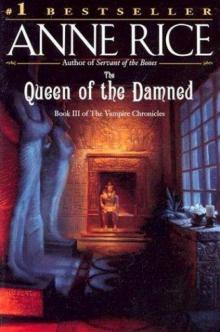 Queen of the Damned
Queen of the Damned The Wolves of Midwinter twgc-2
The Wolves of Midwinter twgc-2 The Mummy
The Mummy Blood and Gold tvc-8
Blood and Gold tvc-8 Blood Communion
Blood Communion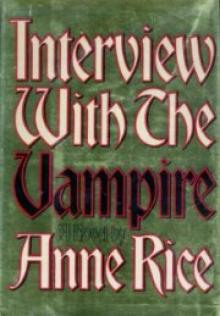 Interview with the Vampire tvc-1
Interview with the Vampire tvc-1 Prince Lestat: The Vampire Chronicles
Prince Lestat: The Vampire Chronicles